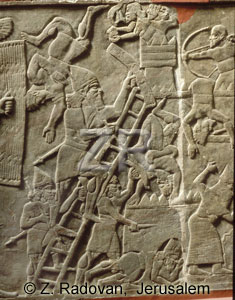 I’ve often wondered the extent to which ancients suffered the same sorts of traumas we hear so much about today. Did ancient Roman, Assyrian and other soldiers experience post traumatic stress disorders and if so, how were these difficulties expressed, dealt with, etc?
I’ve often wondered the extent to which ancients suffered the same sorts of traumas we hear so much about today. Did ancient Roman, Assyrian and other soldiers experience post traumatic stress disorders and if so, how were these difficulties expressed, dealt with, etc?
The Italian Archeologia Biblica e Storia della Chiesa blog by Antonio Lombatti has today posted an article Il Trauma Dei Veterani Assiri that my web translator renders as The Trauma of Assyrian Veterans. Antonio links to a Smithsonian.com article by Laura Clark, Ancient Assyrian Soldiers Were Haunted by War, Too. Laura quotes one of the authors of an article in the current issue of Early Science and Medicine:
“The sorts of symptoms after battle were very clearly what we would call now post-traumatic stress symptoms.
“They described hearing and seeing ghosts talking to them, who would be the ghosts of people they’d killed in battle – and that’s exactly the experience of modern-day soldiers who’ve been involved in close hand-to-hand combat.”
That article takes us to a PubMed page abstract and that’s as far as anyone can go without subscribing — or waiting for the embargo period to end before it is freely available. Damn. The best we can see for now is the abstract:
Herodotus’ account of the Athenian spear carrier Epizelus’ psychogenic mutism following the Marathon Wars is usually cited as the first documented account of post-traumatic stress disorders in historical literature. This paper describes much earlier accounts of post combat disorders that were recorded as occurring in Mesopotamia (present day Iraq) during the Assyrian dynasty (1300-609 BC). The descriptions in this paper include many symptoms of what we would now identify in current diagnostic classification systems as post-traumatic stress disorders; including flashbacks, sleep disturbance and low mood. The Mesopotamians explain the disorder in terms of spirit affliction; the spirit of those enemies whom the patient had killed during battle causing the symptoms.
The article is titled Nothing new under the sun: post-traumatic stress disorders in the ancient world. The authors are Abdul-Hamid W.K., Hughes J.H.
It’s sort of “nice” to know, perhaps. Another reminder they were not so unlike us despite cultural differences and despite the popular (and biblical!) image of them being uniformly steel-hardened and unfazed by the killing. And all that gruesome artwork depicting the dying and the mutilated could hardly have done much for the mental health of any who were afflicted.
If you enjoyed this post, please consider donating to Vridar. Thanks!

Interestingly, I recently read this excerpt about war and PTSD from Fields of Blood by Karen Armstrong.
I quite agree with the sentiment of the last paragraph: ancient people aren’t substantially different than we are – every bit as clever and vulnerable.